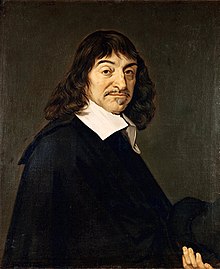René Descartes (/deɪˈkɑːrt/ or UK: /ˈdeɪkɑːrt/; French: [ʁəne dekaʁt] (listen); Latinized:Renatus Cartesius;[b][15] 31 March 1596 – 11 February 1650[16][17][18]: 58 ) was a French philosopher, mathematician, and scientist who invented analytic geometry, linking the previously separate fields of geometry and algebra. He spent a large portion of his working life in the Dutch Republic, initially serving the Dutch States Armyof Maurice of Nassau, Prince of Orange and the Stadtholder of the United Provinces. One of the most notable intellectual figures of the Dutch Golden Age,[19] Descartes is also widely regarded as one of the founders of modern philosophy.
René Descartes | |
|---|---|
 Portrait after Frans Hals[a] | |
| Born | 31 March 1596 |
| Died | 11 February 1650 (aged 53) |
| Nationality | French |
| Education |
|
| Era | 17th-century philosophy Age of Enlightenment |
| Region | Western philosophy Dutch philosophy French philosophy |
| School | |
| Thesis | Untitled LL.B. thesis (1616) |
Main interests | Epistemology, metaphysics, mathematics, physics, cosmology |
Notable ideas | show List |
show Influences | |
show Influenced | |
| Signature | |
https://en.wikipedia.org/wiki/René_Descartes
https://en.wikipedia.org/wiki/Empiricism
Friday, September 17, 2021
09-17-2021-0234 - Measure Observable Universe Observer Quantum Foundations Unobservable Impalpable Incompatibility of observables in quantum mechanics Physics
https://en.wikipedia.org/wiki/Age_of_Enlightenment#Prussia_and_the_German_States
No comments:
Post a Comment